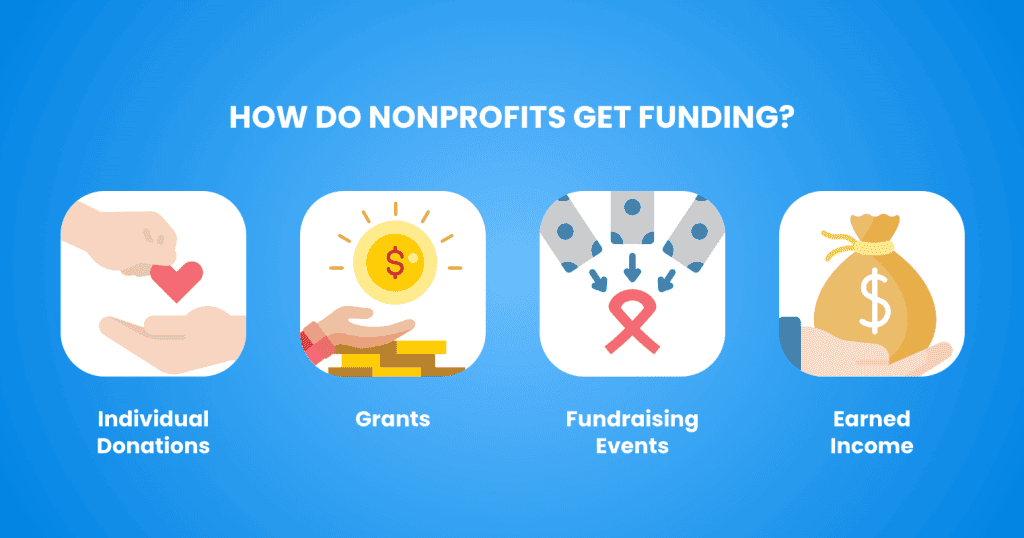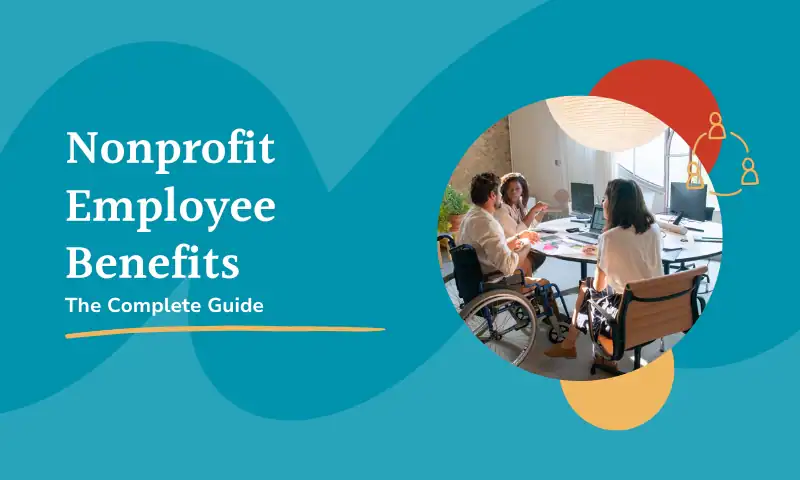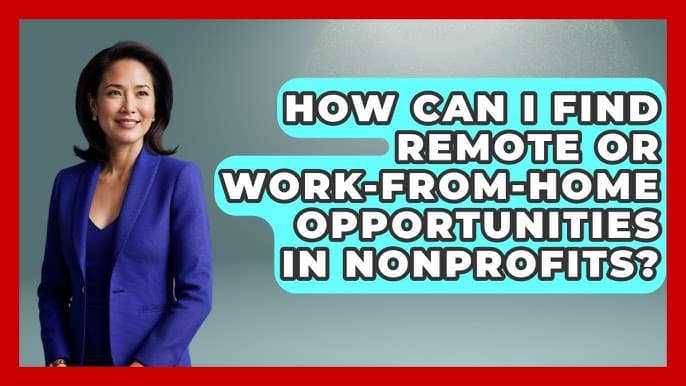If you’re driven by purpose and want your work to make a lasting difference, joining a nonprofit could be your perfect career path—especially if you’re seeking remote flexibility.
The rise of digital tools and mission-driven projects has opened up a wealth of remote job opportunities within charitable, advocacy, and humanitarian organizations.
Whether you’re a seasoned nonprofit professional or just starting out, this list of the best nonprofits to work for remotely will guide you toward meaningful organizations that value both your impact and your work-life balance.
Related: Online Peer Coaching Jobs
What is a Non-Profit Organization (NGO)?

A nonprofit organization (often referred to as an NGO—non-governmental organization) is an entity that operates with a social, educational, charitable, or community-focused mission rather than for profit.
Instead of distributing earnings to shareholders or owners, nonprofits reinvest their revenue to support and expand their programs and services.
These organizations can range from local grassroots initiatives to global institutions tackling issues like poverty, healthcare, environmental sustainability, human rights, and education.
Nonprofits often rely on a mix of donations, grants, and volunteer efforts to fulfill their goals. They must adhere to strict governance structures and are typically tax-exempt under section 501(c)(3) of the U.S. Internal Revenue Code.
With advancements in digital communication and project management tools, many nonprofits now offer fully remote roles—making it easier for passionate individuals to contribute from anywhere in the world.
Who Funds NGOs?

Nonprofits and NGOs typically rely on a diverse range of funding sources to sustain their missions and operations.
Unlike for-profit companies that generate income through sales or investments, NGOs depend on the generosity and support of external contributors. The main funding streams include:
Individual Donations
Many nonprofits receive regular contributions from individuals who are passionate about their cause. These donations can come in the form of one-time gifts, monthly giving programs, or legacy donations through wills and estates.
Crowdfunding platforms have also made it easier for nonprofits to reach wider audiences for individual support.
Grants
Grants are a significant source of funding for many NGOs. These are typically awarded by foundations, corporations, or government agencies.
Grants may be project-specific, general operating support, or targeted toward capacity building.
Applying for and managing grants often requires dedicated personnel and rigorous reporting.
Corporate Sponsorships
Businesses often partner with nonprofits to support charitable causes, enhance their corporate social responsibility (CSR) image, and engage their customer base.
These sponsorships may include financial support, in-kind donations (such as equipment or services), or employee volunteer programs.
Government Funding
Many NGOs—especially those working in sectors like healthcare, education, or disaster relief—receive funding from local, state, or federal government programs.
These funds usually come with strict guidelines and performance metrics.
Membership Fees and Program Income
Some nonprofits generate income through membership fees, ticket sales for events, educational workshops, or merchandise.
While these revenues are modest compared to grants or donations, they contribute to financial sustainability.
International Aid and Philanthropic Foundations
Large global NGOs often receive funding from international development agencies like USAID, the United Nations, or the World Bank, as well as from major philanthropic organizations like the Bill & Melinda Gates Foundation or the Ford Foundation.
Note: This mosaic of funding sources helps NGOs remain operational, expand their impact, and offer employment opportunities—including the growing number of remote roles.
Benefits of Working Remotely for a Nonprofit

Working remotely for a nonprofit offers a unique blend of purpose-driven work and the freedom of location independence.
As more mission-based organizations embrace digital transformation, remote roles have become increasingly common across departments such as communications, fundraising, operations, tech, and administration.
Here are some compelling benefits of working remotely in the nonprofit sector:
Meaningful Work with Flexibility
Remote nonprofit jobs allow you to contribute to important causes—such as climate change, education equity, or global health—from the comfort of your home.
You can align your professional skills with your values while enjoying the flexibility to create a schedule that works for your lifestyle.
Global Collaboration
Many nonprofits operate internationally and offer the chance to collaborate with colleagues, volunteers, and communities from around the world.
Remote work environments often include diverse teams that foster cross-cultural learning and broad professional development.
Work-Life Balance
Remote roles often eliminate long commutes and allow for a better balance between professional responsibilities and personal life.
This flexibility is particularly appealing to parents, caregivers, or individuals seeking healthier boundaries in their daily routines.
Skill Development and Career Growth
Nonprofits often require team members to wear multiple hats, especially in leaner organizations. This hands-on experience across various functions can rapidly expand your skill set.
Many nonprofits also invest in online training and virtual workshops to help remote employees continue learning and advancing their careers.
Compare: 35 Remote Virtual Assistant Jobs
Lower Costs and Higher Job Satisfaction
Remote work reduces commuting costs, work wardrobe expenses, and daily incidentals—resulting in more financial breathing room.
When paired with the emotional reward of working for a mission-driven organization, many remote nonprofit employees report higher levels of job satisfaction and fulfillment.
17 Best Nonprofits to Work for Remotely
The nonprofit sector has embraced remote work like never before, opening the door for professionals across the globe to contribute to meaningful causes without relocating.
The organizations listed below are not only leaders in their respective missions but also champions of flexible work environments.
Whether you’re a tech-savvy strategist, an advocate, or an operations guru, these are the best nonprofits to work for remotely that offer both purpose and work-life balance.
1. Amnesty International
Headquarters: London, United Kingdom
Funding: Primarily through individual donations; does not accept funds from governments for its research and advocacy
Key Partners: UN Human Rights Council, civil society coalitions, media networks
Why It’s Great Remotely: Amnesty has remote roles in digital campaigns, research, translation, and legal analysis. They actively support flexible work arrangements for international staff.
2. Charity: Water
Headquarters: New York City, USA
Funding: 100% of public donations go directly to water projects; operational costs are covered by private donors through a separate fund
Key Partners: Google, P&G, FedEx, local water organizations
Why It’s Great Remotely: Embraces a remote-first mindset in roles such as marketing, impact reporting, design, and operations. Offers high transparency and a mission-focused culture.
3. World Wildlife Fund (WWF)
Headquarters: Gland, Switzerland
Funding: Individual donors, grants, corporate partnerships, government support
Key Partners: NASA, IKEA, Coca-Cola, USAID, local conservation groups
Why It’s Great Remotely: WWF offers remote roles in science, digital content, and communications. Flexible arrangements are supported across various regional offices worldwide.
4. Girls Who Code
Headquarters: New York City, USA
Funding: Corporate sponsorships, individual donations, foundation grants
Key Partners: AT&T, Walmart, Bank of America, Adobe, Dell
Why It’s Great Remotely: A tech-forward nonprofit that supports fully remote teams for curriculum development, marketing, digital strategy, and educational outreach.
5. International Rescue Committee (IRC)
Headquarters: New York City, USA
Funding: Government grants (e.g., USAID), foundations, corporate sponsors, individual donors
Key Partners: UNHCR, Gates Foundation, Airbnb, Google.org
Why It’s Great Remotely: Offers flexible positions in policy, technology, grant management, and monitoring & evaluation. Hybrid and remote options are available even for international staff.
6. Ashoka
Headquarters: Arlington, Virginia, USA
Funding: Primarily funded by philanthropic foundations, individual donors, and corporate partnerships
Key Partners: Skoll Foundation, Bill & Melinda Gates Foundation, Google, McKinsey & Company
Why It’s Great Remotely: Ashoka is a global network of social entrepreneurs and supports a decentralized, collaborative structure that encourages remote work across strategy, communications, and global impact roles.
7. Human Rights Watch
Headquarters: New York City, USA
Funding: Exclusively through private donations from individuals and foundations; does not accept government funding to maintain independence
Key Partners: Ford Foundation, Open Society Foundations, Bloomberg Philanthropies
Why It’s Great Remotely: With researchers and advocates located across continents, Human Rights Watch embraces remote work in writing, legal research, media relations, and tech for human rights.
8. Heifer International
Headquarters: Little Rock, Arkansas, USA
Funding: Funded by donations from individuals, faith communities, and corporate sponsors
Key Partners: USAID, Mastercard Foundation, PepsiCo, FAO (Food and Agriculture Organization)
Why It’s Great Remotely: Heifer offers remote and hybrid roles in development, project evaluation, fundraising, and digital marketing, especially in regions where it implements agricultural development projects.
9. Kiva
Headquarters: San Francisco, California, USA
Funding: Funded through user donations, grants from partners, and lender support
Key Partners: Cisco Foundation, PayPal, Capital One, Skoll Foundation
Why It’s Great Remotely: Kiva supports remote roles across finance, engineering, customer support, and data science. It has a well-structured remote culture and hires globally.
10. Habitat for Humanity International
Headquarters: Atlanta, Georgia, USA
Funding: Supported by corporate sponsors, individual donations, foundation grants, and government partnerships
Key Partners: The Home Depot Foundation, Wells Fargo, Whirlpool, USAID
Why It’s Great Remotely: Habitat has embraced hybrid and fully remote roles in IT, grant writing, HR, global development, and communications, offering international job flexibility.
11. Mozilla Foundation
Headquarters: Mountain View, California, USA
Funding: Funded by Mozilla Corporation (through Firefox revenue), philanthropic donors, and grants
Key Partners: Ford Foundation, Knight Foundation, Open Society Foundations
Why It’s Great Remotely: Mozilla Foundation has a fully remote culture with roles in internet freedom, data privacy advocacy, tech development, and community engagement.
12. Rainforest Alliance
Headquarters: New York City, USA
Funding: Funded through certification programs, corporate partnerships, foundation grants, and donations
Key Partners: Unilever, Nestlé, IKEA, Global Environment Facility (GEF)
Why It’s Great Remotely: The organization provides remote work opportunities in sustainability policy, marketing, data analysis, and environmental science, especially across Latin America and Africa.
13. Teach For All
Headquarters: New York City, USA (with a highly global structure)
Funding: Supported by philanthropic organizations, corporate partners, and individual donors
Key Partners: Deloitte, Vodafone Foundation, UBS Optimus Foundation, LEGO Foundation
Why It’s Great Remotely: Teach For All operates with a global team working across dozens of countries, offering remote roles in education innovation, research, data, and international strategy.
See also: 20 Lucrative Jobs for Former Teachers
14. Mercy Corps
Headquarters: Portland, Oregon, USA
Funding: Mix of public funding (USAID, ECHO, etc.), private donations, and institutional donors
Key Partners: World Food Programme, Google.org, DFID (UK), Mastercard Foundation
Why It’s Great Remotely: Mercy Corps offers remote and field-based positions in humanitarian relief, program operations, digital solutions, and impact measurement.
15. PATH
Headquarters: Seattle, Washington, USA
Funding: Supported by government grants, global health organizations, and major philanthropic foundations
Key Partners: Bill & Melinda Gates Foundation, WHO, UNICEF, CDC, Gavi
Why It’s Great Remotely: PATH has a modern approach to global health work, with remote-friendly roles in vaccine delivery, digital health, data systems, and project coordination.
16. One Acre Fund
Headquarters: Kigali, Rwanda (U.S. offices in New York)
Funding: Philanthropic donors, impact investors, and institutional grants
Key Partners: Mulago Foundation, Skoll Foundation, DFID, Omidyar Network
Why It’s Great Remotely: Focused on agricultural development, One Acre Fund hires remotely for data analysis, impact evaluation, finance, and international program design, with global flexibility.
17. Environmental Defense Fund (EDF)
Headquarters: New York City, USA
Funding: Primarily through individual donors, foundations, and corporate partners
Key Partners: Walmart, FedEx, EDF Renewables, ClimateWorks Foundation
Why It’s Great Remotely: EDF offers remote opportunities in environmental policy, climate science, clean energy advocacy, and communications. Their flexible work culture supports long-term remote careers.
Expert Tips on Finding Remote Nonprofit Work

Landing a remote job at a nonprofit requires more than just passion—it also takes strategy, the right tools, and a targeted approach.
Whether you’re looking to transition from the corporate world or deepen your impact-driven career, here are expert-backed tips to help you break into the world of remote nonprofit work.
Tailor Your Resume to Emphasize Impact and Adaptability
Nonprofits value employees who are mission-driven and versatile. Highlight your technical or administrative skills and your ability to work independently, manage projects virtually, and collaborate across time zones.
Be sure to quantify impact when possible—for example, “coordinated donor campaigns that raised $50,000 remotely.”
Use Specialized Job Boards for Mission-Driven Work
While general job platforms like LinkedIn or Indeed may list remote nonprofit roles, niche job boards often have better leads.
Try websites like Idealist.org, Work for Good, Escape the City, Devex, and NGO Jobs.
These platforms are curated specifically for social impact work and often feature remote opportunities from global and grassroots NGOs alike.
Volunteer Remotely to Build Experience and Connections
Remote volunteering is an excellent way to get your foot in the door, especially if you’re pivoting from another industry.
Websites like Catchafire.org and VolunteerMatch.org allow you to donate your time and skills to real nonprofit projects—think graphic design, grant writing, social media, or data analysis—while building relationships and gaining relevant experience.
Network in the Mission-Driven Space
Follow nonprofit organizations and thought leaders on LinkedIn and X (formerly Twitter).
Join virtual events, webinars, and online communities like Facebook groups dedicated to nonprofit careers.
Often, job openings are shared internally or filled through connections before they’re ever publicly posted.
Search with Flexible Keywords
When browsing for roles, don’t limit your search to the term “remote.” Also try combinations like “virtual,” “telecommute,” “work from anywhere,” or “distributed team.”
Some nonprofits—especially smaller ones—may not use standard corporate language but still offer full flexibility.
Focus on Organizations with a Global or Decentralized Structure
International or nationwide nonprofits often have remote infrastructure already in place.
These are more likely to support long-term remote employees and offer remote roles across time zones.
Research their team structure before applying to see how they manage distributed staff.
Look for Roles in Digital-Friendly Fields
Certain roles are especially suited to remote nonprofit work—such as grant writing, digital communications, data management, fundraising strategy, research, policy writing, and donor engagement.
If you have transferable experience in these areas, you’ll find a wider pool of remote opportunities.
Prepare for Mission-Driven Interviews
Nonprofit interviews often explore your alignment with their mission and values.
Be ready to discuss why their cause resonates with you, how you’ve handled resource limitations, and how you collaborate with diverse teams remotely.
Practice responses that show both your competence and compassion.
Frequently Asked Questions (FAQs)
Q: What is the best non-profit organization to work for?
A: The best non-profit organization to work for depends on your values, skill set, and career goals. However, globally recognized organizations like Doctors Without Borders, World Wildlife Fund (WWF), and Human Rights Watch often top the list due to their impactful missions, positive work culture, and flexible remote options. If you’re specifically looking for the best nonprofits to work for remotely, consider Mozilla Foundation or Kiva, both known for their fully remote, innovative teams.
Q: What is the highest paying job in a non-profit?
A: The highest paying jobs in nonprofit organizations typically fall within executive leadership. Roles such as Chief Executive Officer (CEO), Chief Financial Officer (CFO), and Chief Development Officer (CDO) can earn six-figure salaries, especially in large NGOs with global operations. Additionally, medical directors, legal advisors, and senior policy analysts in health-focused or advocacy nonprofits can also command high compensation.
Q: What is the easiest highest paying remote job?
A: While “easy” is subjective, some of the highest paying remote jobs that don’t always require advanced degrees include UX/UI designers, grant writers, digital marketers, and fundraising consultants. In the nonprofit space, experienced grant writers and development professionals can earn $70,000 to $120,000 annually working remotely, especially if they have a successful track record with major donors and foundations.
Q: Which is the highest paid NGO job?
A: The highest paid NGO jobs are typically in global program management, international public health, and executive leadership. For example, a Global Program Director at a large organization like PATH or Mercy Corps can earn over $150,000 annually. Specialized roles in global health policy, emergency response coordination, and strategic partnerships are also among the highest compensated.
Q: What is the most successful nonprofit?
A: In terms of global influence and fundraising power, The Bill & Melinda Gates Foundation is considered one of the most successful nonprofits in the world. It holds the largest endowment of any private foundation and has made transformative contributions to global health, education, and economic development. However, in terms of grassroots engagement and long-term sustainability, nonprofits like World Wildlife Fund, Doctors Without Borders, and Habitat for Humanity are also considered highly successful by mission and impact metrics.
Conclusion
Finding meaningful work that aligns with your values doesn’t have to mean sacrificing flexibility.
These 17 best nonprofits to work for remotely prove that you can build a purpose-driven career while working remotely.
Whether you’re passionate about human rights, environmental justice, global health, or digital equity, there’s a nonprofit out there that shares your mission and supports remote professionals.
From globally established giants like World Wildlife Fund and Doctors Without Borders to digital pioneers like Mozilla Foundation and Kiva, each organization on this list offers a unique combination of impactful work, remote infrastructure, and supportive culture.
With the rise of distributed teams and digital advocacy, there’s never been a better time to pursue remote opportunities in the nonprofit sector.
Take the next step: update your resume, network within the impact space, and explore remote listings on nonprofit job boards.
Your dream job—one where you can change the world without leaving your home—might be just a few clicks away.











